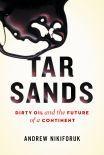
Although written in 2008, Tar Sands: Dirty Oil and the Future of a Continent feels like something that could’ve been written yesterday. Extremely biased and one-sided, at times bordering on vitriolic, Andrew Nikiforuk, Tar Sands’ author, makes a strong argument against the development of the Athabaskan tar sands. While this is a losing battle if there ever was one, ignoring his warnings will only further his point that humanity has rushed ahead of itself in search of more oil.
Nikiforuk points out that the tar sands are by no means new sources of energy. However, the technology to extract oil from them is fairly new.
In the chapter “Highway to Hell”, Nikiforuk outlines the social impact of money on the nearby town of Fort McMurray. High wages and lack of affordable housing, along with stressful work conditions have been linked to increases in drug and alcohol use as well as higher rates of divorce, assaults, and impaired driving.
I didn’t keep track of how many times the term sustainable and sustainable development (see my “open letter” for more on this) were used in reference to tar sands development, but the idea that this extraction is somehow related to these concepts is laughable. Nikiforuk does not use them in his writing or commentary, but they come up repeatedly in the oil companies’ discussion of Athabasca and the tar sands.
As an example of the unsustainable nature of this project, repeatedly called the largest energy development in the world throughout the book, Nikiforuk states it takes 12 barrels of water to produce 1 barrel of bitumen, with a quarter of the water ending up as tailings in the large catchment system for waste water.
Perhaps the most staggering, and really damning component of the story, is the amount of water and energy required to develop the tar sands. Nikiforuk mentions the proposal to strip mine 120 square miles to produce coal for gasification in order to power some of the machinery (the upgraders).
One of the solutions proffered to deal with the issue is carbon capture and storage (CCS, also known as carbon sequestration). Nikiforuk cites University of Manitoba energy expert Vaclav Smil who argues that CCS “is part of the same thinking that gave us the energy spectacle of ‘a 50-kg female driving a 3000-kg SUV in order to pick up [a] 1-kg of milk.’”
In the end, Nikiforuk presents a 12-step program, yes like Alcoholics Anonymous, but he is not entirely unrealistic. Instead of proposing a complete ban on all tar sands development, he supports a cap at 2 million barrels per day. Many in the industry are aiming for 5 million by 2030, but as Nikiforuk argues throughout his book, this unchecked growth in tar sands production has created a situation where health (environmental and human) are disregarded in the name of oil.
[Image source]




